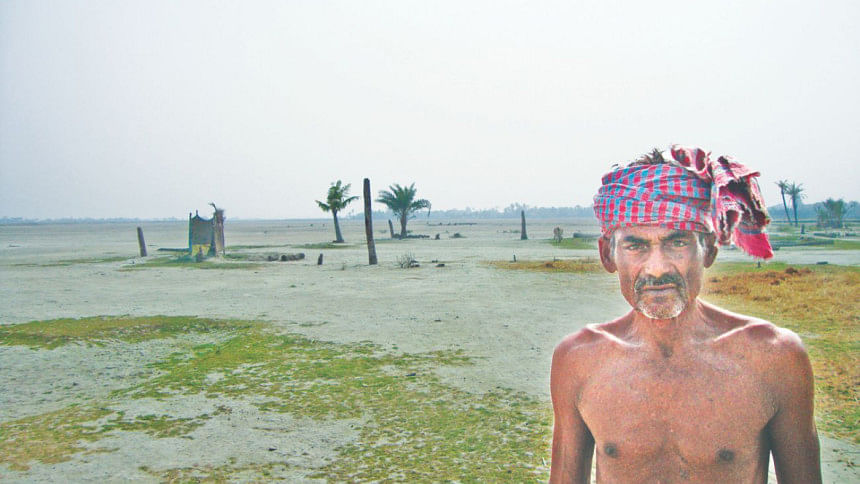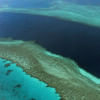Dredging makes a desert

Once profitable farming communities, the villages of Hurka and Charakhali in Bagerhat's Rampal upazila are now a mini-desert. In 2014 the Bangladesh Inland Water Transport Authority initiated a project to dredge the adjacent Mongla-Ghashiyakhali Channel. When the dredging works were completed in the area in February 2015, it was a rude awakening for villagers to learn that the contractor had no responsible plan for disposing of the dredged silt. Sand and saltwater were randomly dumped on private land, rendering many farm fields useless.
“I was happy,” says farmer Uday Shankar Mukharjee, 40, from Maddya Hurka. “From shrimp and paddy farming on three bighas, my family lived comfortably. Now the land is covered in sand. Nothing will grow. I tried to remove the sand to sow paddy but I failed. Since the dredging, we have relied on income from another bigha located elsewhere. It doesn't cover living costs.”
As he spoke with The Daily Star three years after the dredging works ruined his land, Uday together with his wife were still trying to remove sand. They still hope to reduce the land's elevation such that water might collect there as it used to, as is suitable for paddy.
“My son Arpan studies in class X, my daughter Anti in class VIII,” Uday continues. “I used to dream they would complete higher education. That dream is shattered. For now they are still in school, but for how much longer I don't know.”
The dredging project in that section of the Kumarkhali River-linked channel was implemented by Bashundhara Dredging Company Limited. The project aimed to facilitate an alternate transport route for cargo vessels that would reduce the impact of shipping on the Sundarbans.
Of course, for the approximately 300 farmers in these two villages whose land was affected by indiscriminate sand dumping, the project's broader merit is of no consequence.
“I had six bighas to farm that are now sand,” says another farmer from the same village, Tusar Kirtaniya, 55. “I have a little land elsewhere; and I work other people's land to have any hope of my two daughters finishing their education. I tried to grow paddy in the sand. Even potatoes wouldn't grow. Besides, our cattle are at risk for the lack of available pasture.”
When he spoke of his three bighas, forty-year-old neighbour Biswajit Kirtaniya cried. “I had coconut palms and other trees in my orchard,” he says. “The trees died from the saline water. All that's left is a desert.”
“We do favour saline-tolerant crops in these areas,” says Bagerhat's deputy director of the agriculture extension department, Mohammad Aftab Uddin, “but the salinity of the dredged sand in Maddya Hurka and Charkhali is still too high. No crops will grow there now, not for the next several years.”
“About 200 acres of farmland has been degraded by the dredging, leaving more than 300 families in distress,” says Bagerhat's deputy commissioner Tapan Kumar Biswas. “The government will take the initiative to solve the problem. Technical experts are needed and I am not sure if any project has been initiated. I will inform higher authorities about the woes of the area's farmers.”

 For all latest news, follow The Daily Star's Google News channel.
For all latest news, follow The Daily Star's Google News channel. 




Comments